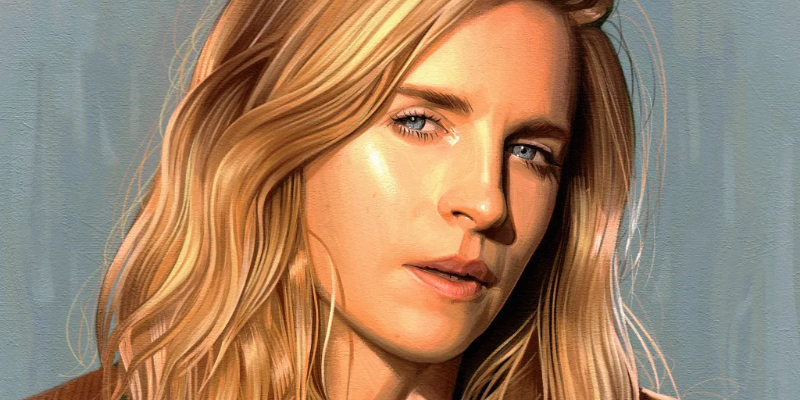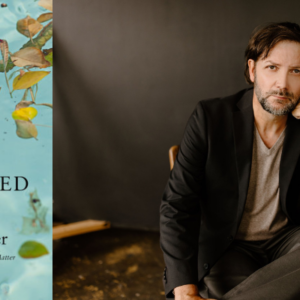Brit Marling on Writing Women Who Get to the End of Their Stories
This Week on the Talk Easy Podcast with Sam Fragoso
Illustration by Krishna Bala Shenoi.
Talk Easy with Sam Fragoso is a weekly series of intimate conversations with artists, authors, and politicians. It’s a podcast where people sound like people. New episodes air every Sunday, distributed by Pushkin Industries.
*
For more than a decade, actor and writer Brit Marling has made futuristic work that reveals truths about our disquieting present. Her latest endeavor, A Murder At the End of the World, is no exception.
We recently sat with Marling in front of a live audience as part of this year’s On Air Fest LA Annex, where we discussed her excellent new show on FX, the role artificial intelligence may play in the future of filmmaking, and where she first fell in love with science fiction. Then, Brit reflects on her winding path at Goldman Sachs and Georgetown, where she met longtime collaborators Zal Batmanglij and Mike Cahill that would eventually result in films like Another Earth and Sound of My Voice.
On the back-half, we speak on the power of collective action, the public outcry that followed the cancellation of The OA, the state of Hollywood, and why Brit was inspired to direct upon finding a passage from the late Polish auteur, Krzysztof Kieślowski.
Subscribe and download the episode, wherever you get your podcasts!
From the episode:
Sam Fragoso: There are so many places to begin, but I figured we’d start with a passage from Rebecca Solnit’s 2020 memoir, Recollections of My Nonexistence. In it, she writes:
Becoming a writer formalizes the task that faces us all in making a life: to become conscious of what the overarching stories are, and whether or not they serve you, and how to then compose versions with room for who you are and what you value.
Brit Marling: That feels like a mic drop moment. Do we need to even say anything else?
SF: [Laughs] Honestly, thanks for coming out. I think we’re good here. But in the four years since we first sat down, as you and Zal Batmanglij began to embark on this new show, A Murder at the End of the World, what were those overarching stories that you wanted to tell, and where do you and your values fit into them?
BM: You always go so deep right from the start. Around that time, I had written this op-ed for The New York Times called “I Don’t Want to Be the Strong Female Lead,” which was an essay trying to wrestle with the idea of what to do about female protagonism. One of my answers has been, as a storyteller, to operate in a space a little bit outside of reality. Because if you deal with reality head-on, you’re just constantly dealing with some measure of oppression or being an oppressed character. I felt like science fiction and fantasy was this way to get a little bit outside of that.
adrienne maree brown has this really beautiful term I’ve heard her use—she’s an activist and a writer—she calls it resistance fiction, this idea that all fiction either reinforces the status quo or rebels against it. So, I felt like I was always operating in the space of science fiction or fantasy as resistance fiction. Then, part of what started to form with the idea of A Murder at the End of the World was braiding some of that, calling something in, but also trying to make something more in the world as we know it, present day, and contend with the realities of violence against women, and not show it on-screen in a way that perpetuated it, but just deal with the echoes of it. I used to have long conversations with Rebecca Solnit, and we’d talk about these ideas, of the struggle of a woman to realize yourself when you can’t often find yourself mirrored back to yourself in fiction. In writing this story, I spent a lot of time in the library just reading screenwriting books and plays and scripts. I think I read The Silence of the Lambs hundreds of times.
SF: Why that one?
BM: I was looking for female characters that felt authentic and alive and like the women I know in my life. Jodie Foster in The Silence of the Lambs was FBI in-training, but she never asked anyone for permission. She believed in herself, and therefore we the audience believed in her. I also felt inspired by Antigone. Of course Antigone, being so bold and brilliant as a young woman, has to die in the narrative, so I was thinking, “is there any way we can write women like this who don’t die? Can they live? Can they get to the end?”
__________________
bio
Sam Fragoso is the host of Talk Easy with Sam Fragoso, a weekly series of conversations with artists, activists, and politicians. His writing has appeared in The Atlantic, Vanity Fair, and NPR. After conducting seminal interviews with icons like Spike Lee, Werner Herzog, and Noam Chomsky, he independently founded Talk Easy in 2016.




















